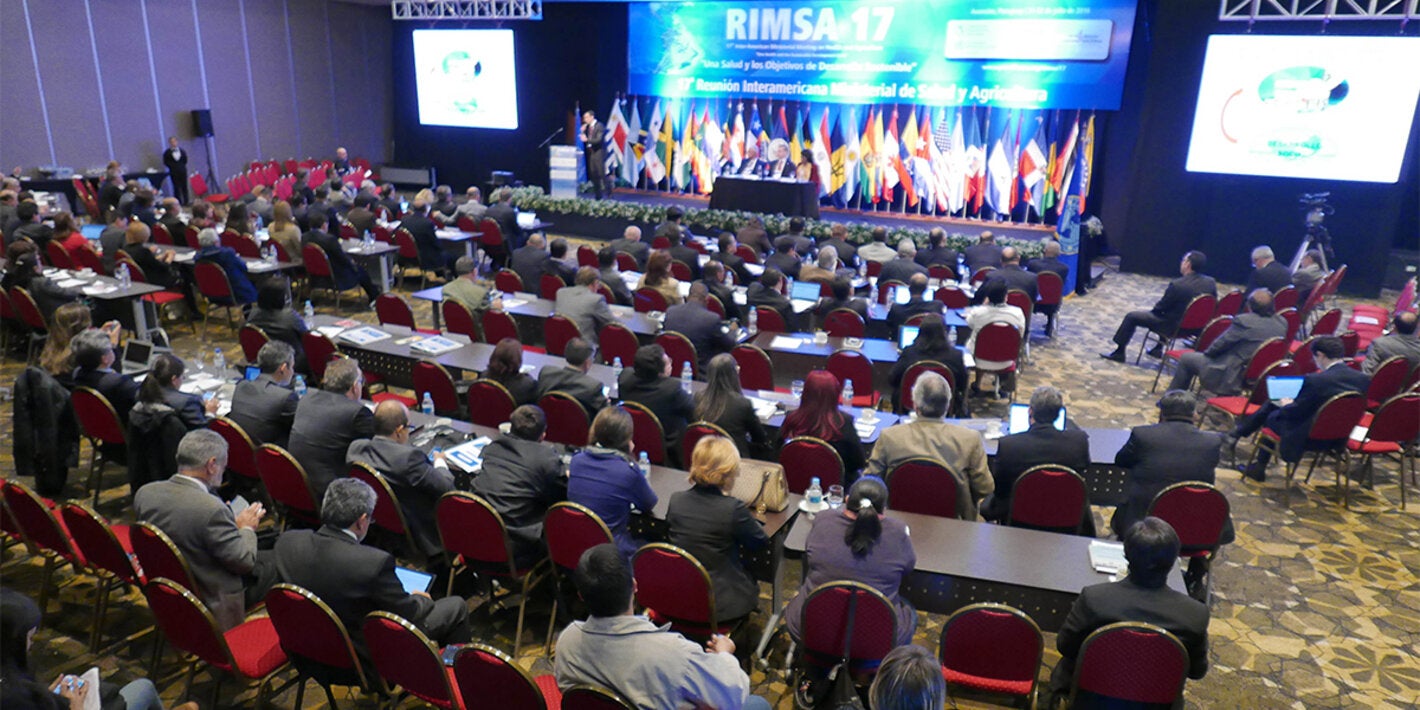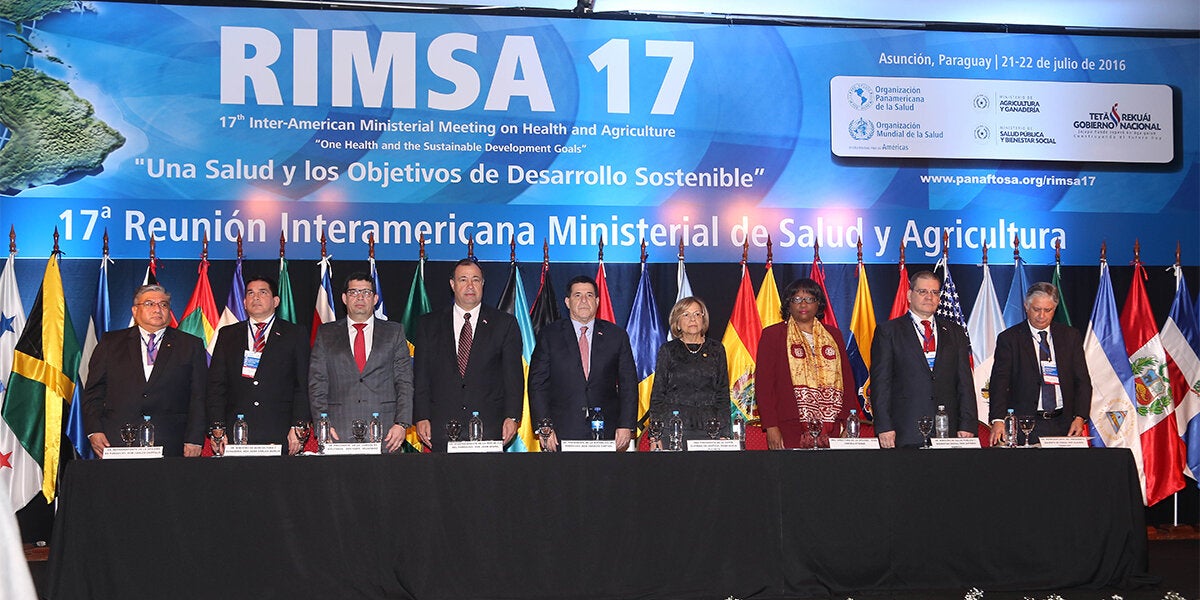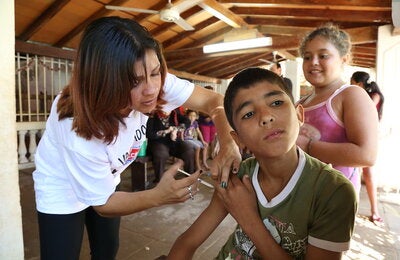
Washington, July 21, 2016 (PAHO/WHO) — The countries of the Americas could set an example for the world "by pledging to work together to rationalize the use of antimicrobials in animal production, adopting standards for antimicrobial use that put human health at the center," said Carissa F. Etienne, Director of the Pan American Health Organization (PAHO) in opening the 17th Inter-American Ministerial Meeting on Health and Agriculture (RIMSA 17) today in Asunción, Paraguay. Ministers of health and agriculture from throughout the Americas have traveled to Paraguay this week for the high-level meeting.
In her opening address, Etienne said action aimed at preventing antimicrobial resistance would also bring social and economic benefits "as our Region becomes synonymous with healthy food production." She added that this idea has been used successfully by organic growers and grass-fed beef producers in the Region. Etienne urged the ministers of health and agriculture to recognize the importance of halting the growth of antimicrobial resistance to prevent "a future in which life-threatening infections no longer have a cure."
Paraguayan President Horacio Cartes Jara was on hand for the meeting's opening, along with Vice-president Juan Afara, President of the Supreme Court of Justice Alicia Pucheta, President of the Chamber of Deputies Hugo Velázquez Moreno, Minister of Agriculture Juan Carlos Baruja, and Minister of Public Health and Social Welfare Antonio Barrios, among other dignitaries.
RIMSA is the most important forum in the Americas for defining veterinary public health policies. Under the theme One Health and the Sustainable Development Goals, this year's participants will analyze issues related to food safety, eradication of foot-and-mouth disease from the Americas, and prevention and control of zoonotic diseases. They will also discuss strengthening work on issues related to the animal-human health interface, which are essential to the mitigation and containment of the impact of antimicrobial resistance.
"The data available to us are limited, but we do know that in some countries, nearly three-quarters of antimicrobial medicines are used in the production of food animals, including aquaculture," noted Etienne. "They are used most extensively to prevent disease and to promote growth in food animals, and this most commonly involves mass drug administration to many animals at the same time. This practice provides favorable conditions for the emergence, spread, and persistence of antimicrobial resistance. We are already seeing the very serious consequences of growing antibiotic resistance for human health."
Etienne urged the ministers to work together to safeguard the health of future generations and highlighted the opportunity to promote action at the upcoming High-Level Dialogue on Antimicrobial Resistance during the UN General Assembly in September.
Surveillance, SDGs and food safety
"The agriculture and health sectors are closely linked," Etienne noted. "These linkages have become center stage with the emergence and spread of zoonoses such as H5N1 and H1N1 influenza, SARS, bovine spongiform encephalopathy and more recently, the Middle East respiratory syndrome coronavirus, Ebola, chikungunya, and Zika."
Etienne said a central challenge facing the ministers is "to integrate the efforts of the health and agriculture sectors to more effectively reduce risks and control outbreaks of zoonotic diseases in both animals and humans." To achieve this, "we need to build mutual trust between our sectors and with the community, through planned and periodic interactions, in which we develop and test coordinated responses to zoonotic risks."
This also requires the creation of mechanisms for effective collaboration between the two sectors to advance the new Sustainable Development Goals (SDGs), especially goals 2 and 3, which seek to eradicate hunger and ensure healthy lives for all, said Etienne.
Ministers at the meeting will also discuss action to address foodborne diseases, which cause some 14,000 deaths and 77 million illnesses in the Americas every year. Etienne noted that these illnesses are a significant burden on health systems, reduce productivity, and cause substantial economic losses for tourism as well as for food producers and exporters. She welcomed their discussions on "the critical components of effective food safety systems and how we in health and agriculture can work together to strengthen these systems in all our countries."
RIMSA meets every four years and its main function is to unite the national authorities from the health and agricultural sectors, at ministerial level, to debate on country needs and on PAHO proposals in the area of veterinary public health.
The Veterinary Public Health/Pan American Foot-and-Mouth Disease Center (PANAFTOSA) of the Pan American Health Organization/World Health Organization (PAHO/WHO) is organizing RIMSA 17, with the support and sponsorship of Government of Paraguay, through the Ministries of Public Health and Social Welfare (MSPBS), Ministry of Agriculture and Livestock (MAG), Ministry of Foreign Affairs (MRE) and the National Service of Quality and Animal Health (SENACSA).
Media Contacts
In Paraguay:
Carla Perdiz, PANAFTOSA-PAHO/WHO, perdizca@paho.org, tel.: +55 21 972224625
Eduardo Rivero, PAHO Paraguay, riveroedu@paho.org, tel.: +595986915508
In Washington, DC:
Daniel Epstein, PAHO/WHO, epsteind@paho.org, tel.: +(1)202- 974-3579
Leticia Linn, PAHO/WHO, linnl@paho.org, tel.: +(1) 202-974-3440




